TUTOR1 STUDYHUB
BEST RELIABLE AND TRUSTWORTHY STUDYMATERIALS
- 852
- 0
- 0
Community
- Followers
- Following
1 Reviews received
852 items
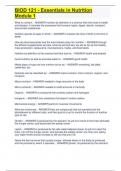
BIOD 121 - Essentials in Nutrition Module 1
BIOD 121 - Essentials in Nutrition Module 1 What is nutrition: - ANSWER-nutrition by definition is a science that links food to health and disease. It includes the processes that humans ingest, digest, absorb, transport, and excrete substances Nutrition spands all ages in which: - ANSWER-it impacts the time of birth to the time of death How do pharmaceuticals and the food industry play into nutrition: - ANSWER-through the different supplements we take, what we eat and why we eat as far as fo...
- Exam (elaborations)
- • 7 pages •
BIOD 121 - Essentials in Nutrition Module 1 What is nutrition: - ANSWER-nutrition by definition is a science that links food to health and disease. It includes the processes that humans ingest, digest, absorb, transport, and excrete substances Nutrition spands all ages in which: - ANSWER-it impacts the time of birth to the time of death How do pharmaceuticals and the food industry play into nutrition: - ANSWER-through the different supplements we take, what we eat and why we eat as far as fo...
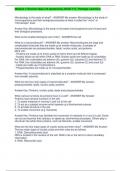
Module 1 Review Quiz
Module 1 Review Quiz (16 questions), BIOD 171, Portage Learning Microbiology is the study of what? - ANSWER-My answer: Microbiology is the study of microorganisms and their biological processes at what is called the "micro" or "microscopic" level. Answer Key: Microbiology is the study of microbes (microorganisms and viruses) and their biological processes. What is the smallest biological unit of life? - ANSWER-the cell What is a macromolecule? - ANSWER-My answer: Macromolecules are large...
- Exam (elaborations)
- • 4 pages •
Module 1 Review Quiz (16 questions), BIOD 171, Portage Learning Microbiology is the study of what? - ANSWER-My answer: Microbiology is the study of microorganisms and their biological processes at what is called the "micro" or "microscopic" level. Answer Key: Microbiology is the study of microbes (microorganisms and viruses) and their biological processes. What is the smallest biological unit of life? - ANSWER-the cell What is a macromolecule? - ANSWER-My answer: Macromolecules are large...
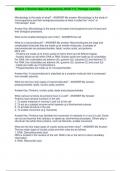
Module 1 Review Quiz
Module 1 Review Quiz (16 questions), BIOD 171, Portage Learning Microbiology is the study of what? - ANSWER-My answer: Microbiology is the study of microorganisms and their biological processes at what is called the "micro" or "microscopic" level. Answer Key: Microbiology is the study of microbes (microorganisms and viruses) and their biological processes. What is the smallest biological unit of life? - ANSWER-the cell What is a macromolecule? - ANSWER-My answer: Macromolecules are large...
- Exam (elaborations)
- • 4 pages •
Module 1 Review Quiz (16 questions), BIOD 171, Portage Learning Microbiology is the study of what? - ANSWER-My answer: Microbiology is the study of microorganisms and their biological processes at what is called the "micro" or "microscopic" level. Answer Key: Microbiology is the study of microbes (microorganisms and viruses) and their biological processes. What is the smallest biological unit of life? - ANSWER-the cell What is a macromolecule? - ANSWER-My answer: Macromolecules are large...
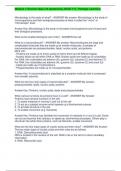
Module 1 Review Quiz
Module 1 Review Quiz (16 questions), BIOD 171, Portage Learning Microbiology is the study of what? - ANSWER-My answer: Microbiology is the study of microorganisms and their biological processes at what is called the "micro" or "microscopic" level. Answer Key: Microbiology is the study of microbes (microorganisms and viruses) and their biological processes. What is the smallest biological unit of life? - ANSWER-the cell What is a macromolecule? - ANSWER-My answer: Macromolecules are large...
- Exam (elaborations)
- • 4 pages •
Module 1 Review Quiz (16 questions), BIOD 171, Portage Learning Microbiology is the study of what? - ANSWER-My answer: Microbiology is the study of microorganisms and their biological processes at what is called the "micro" or "microscopic" level. Answer Key: Microbiology is the study of microbes (microorganisms and viruses) and their biological processes. What is the smallest biological unit of life? - ANSWER-the cell What is a macromolecule? - ANSWER-My answer: Macromolecules are large...
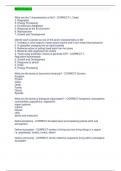
BIOD Exam
BIOD Exam 2 What are the 7 characteristics of life? - CORRECT-1. Order 2. Regulation 3. Energy Processing 4. Evolutionary Adaptation 5. Response to the Environment 6. Reproduction 7. Growth and Development
- Exam (elaborations)
- • 6 pages •
BIOD Exam 2 What are the 7 characteristics of life? - CORRECT-1. Order 2. Regulation 3. Energy Processing 4. Evolutionary Adaptation 5. Response to the Environment 6. Reproduction 7. Growth and Development
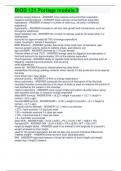
BIOD 121 Portage module 3 positive energy balance
BIOD 121 Portage module 3 positive energy balance - ANSWER-more calories consumed than expended negative energy balance - ANSWER-fewer calories consumed than expended hyperplasia - ANSWER-increase in number of cells (e.g., fat cells in childhood, pregnancy) hypertrophy - ANSWER-increase in cell size (low growth and maintenance, such as throughout adulthood) basal metabolic rate - ANSWER-the number of calories used by the body while in a fasting state accounts for approximately 60-70% of energy ...
- Exam (elaborations)
- • 4 pages •
BIOD 121 Portage module 3 positive energy balance - ANSWER-more calories consumed than expended negative energy balance - ANSWER-fewer calories consumed than expended hyperplasia - ANSWER-increase in number of cells (e.g., fat cells in childhood, pregnancy) hypertrophy - ANSWER-increase in cell size (low growth and maintenance, such as throughout adulthood) basal metabolic rate - ANSWER-the number of calories used by the body while in a fasting state accounts for approximately 60-70% of energy ...
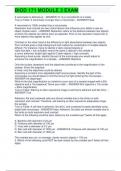
BIOD 171 MODULE 3 EXAM
BIOD 171 MODULE 3 EXAM A nanometer is defined as: - ANSWER-10 -9 or one-billionth of a meter True or False: A nanometer is longer than a micrometer - ANSWER-False A nanometer is 1000x smaller than a micrometer Resolution and contrast are two critical factors that influence your ability to see an object. Explain each. - ANSWER-Resolution refers to the distance between two objects at which the objects can still be seen as separate. Poor or low resolution means two or more objects may appear as o...
- Exam (elaborations)
- • 4 pages •
BIOD 171 MODULE 3 EXAM A nanometer is defined as: - ANSWER-10 -9 or one-billionth of a meter True or False: A nanometer is longer than a micrometer - ANSWER-False A nanometer is 1000x smaller than a micrometer Resolution and contrast are two critical factors that influence your ability to see an object. Explain each. - ANSWER-Resolution refers to the distance between two objects at which the objects can still be seen as separate. Poor or low resolution means two or more objects may appear as o...
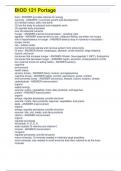
BIOD 121 Portage food
BIOD 121 Portage food - ANSWER-provides calories for energy nutrients - ANSWER-(1) promote growth and development; (2) maintain tissue, cells, and bone; (3) fuel the body for physical and metabolic work; (4) regulate body processes over 45 essential nutrients hunger - ANSWER-internal drive/sensation - growling, pain appetite - ANSWER-external drive to eat - pleasant feeling, eat when not hungry role of hypothalamus in hunger - ANSWER-detects drop in nutrients in circulation - hunger center rise...
- Exam (elaborations)
- • 2 pages •
BIOD 121 Portage food - ANSWER-provides calories for energy nutrients - ANSWER-(1) promote growth and development; (2) maintain tissue, cells, and bone; (3) fuel the body for physical and metabolic work; (4) regulate body processes over 45 essential nutrients hunger - ANSWER-internal drive/sensation - growling, pain appetite - ANSWER-external drive to eat - pleasant feeling, eat when not hungry role of hypothalamus in hunger - ANSWER-detects drop in nutrients in circulation - hunger center rise...
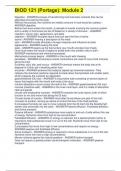
BIOD 121 (Portage): Module 2 Digestion
BIOD 121 (Portage): Module 2 Digestion - ANSWER-process of transforming food into basic nutrients that can be absorbed and used by the body Without the process, the nutrients we initially consume in food would be useless: - ANSWER-digestion Before food even enters the mouth, a cascade of events involving the nervous system and a variety of hormones are set off based on a variety of stimulus: - ANSWER-cognition, sound, odor, appearance, and taste cognition - ANSWER-thoughts about food can start ...
- Exam (elaborations)
- • 9 pages •
BIOD 121 (Portage): Module 2 Digestion - ANSWER-process of transforming food into basic nutrients that can be absorbed and used by the body Without the process, the nutrients we initially consume in food would be useless: - ANSWER-digestion Before food even enters the mouth, a cascade of events involving the nervous system and a variety of hormones are set off based on a variety of stimulus: - ANSWER-cognition, sound, odor, appearance, and taste cognition - ANSWER-thoughts about food can start ...
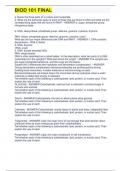
BIOD 101 FINAL
BIOD 101 FINAL a. Name the three parts of a nucleic acid nucleotide. b. What are the particular types of each of these that are found in DNA and what are the corresponding types that are found in RNA? - ANSWER-a. sugar, phosphate group, nitrogenous base b. DNA- deoxyribose- phosphate group- adenine, guanine, cytosine, thymine RNA- ribose -phosphate group- adenine, guanine, cytosine, uracil What are the four major differences btw DNA and RNA? - ANSWER-1. DNA contains deoxyribose - RNA is ribos...
- Exam (elaborations)
- • 47 pages •
BIOD 101 FINAL a. Name the three parts of a nucleic acid nucleotide. b. What are the particular types of each of these that are found in DNA and what are the corresponding types that are found in RNA? - ANSWER-a. sugar, phosphate group, nitrogenous base b. DNA- deoxyribose- phosphate group- adenine, guanine, cytosine, thymine RNA- ribose -phosphate group- adenine, guanine, cytosine, uracil What are the four major differences btw DNA and RNA? - ANSWER-1. DNA contains deoxyribose - RNA is ribos...

PN HESI EXIT EXAM 2023/2024 LATEST VERSION QUESTIONS AND ANSWERS BEST GRADED A+ ASSURED SUCCESS FOR NURSING 1)
BEST SELLER